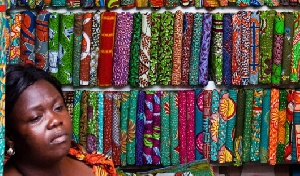The Chairman of the Ministry of Trade and Industry (MOTI) Task Force, Mr. Appiah Donyina on Tuesday cautioned textile traders at Mankessim, against the sale of pirated Ghanaian textile designs and trademarks.
He told them that the designated entry points for importation of textiles into the country were the Kotoka International Airport, and the Tema and Takoradi Ports, and advised traders to buy from accredited distributors of textile companies whose designs they want to sell, in order to get authentic fabrics.
Mr Donyina gave the warning at a workshop held at Mankessim by the Ministry, to sensitize textile traders in the district and surrounding towns, as part of the “National crusade against trade in pirated Ghanaian textile designs and trademarks.”
Mr. Donyina who is also the Chief Commissioning Officer of the MOTI Tariff Advisory Board, indicated that over 6,000 pieces of pirated fabrics have so far been destroyed nationwide, and that the task force had given the retailers another chance to phase- out the pirated fabrics so they would not be blamed when the fabrics were seized and destroyed.
He explained that the traders were at liberty to sell fabrics imported into the country, except those that were not made in Ghana, but bore Ghanaian labels as well as those that were pirated Ghanaian designs.
The Task Force Chairman said retailers of pirated fabrics were as guilty as the importers, and therefore, advised the traders to desist from engaging in such illegal trading activities, to avoid the seizure of their goods into which they have invested huge sums of money.
He said government has the interest of all those involved in the textiles business at heart, and has put in place measures to protect them, adding that the patronage of Ghanaian fabrics could create employment for the many unemployed youth in the country.
The Director of the Ghana Standards Authority (GSA), Mr. Esmond Arde Acquah, said textiles were high risked goods that needed to be well assessed, to ensure highest standards, noting that some of the chemicals used in textile production, could cause harm to the body if not properly supervised
He indicated that most of the pirated textiles were not properly supervised, and therefore exposed users to all kinds of dangers, including cancer.
The Assistant Manager, Brands Protection of the Akosombo Textiles Limited, Mr. John Kwesi Amoah, said the creation and registration of designs, involved a lot of resources, and must not be allowed to be pirated.
He said Ghanaian Textile Companies considered the weather condition in the country, and therefore used 100 percent cotton in the production of the textiles while the pirated ones were made from substances dominated by rubber, thereby making them not durable.
Mr. Amoah affirmed that the poor quality of these fabrics which bore Ghanaian labels were driving away the interest of Ghanaians in the locally-made products, and therefore urged patrons to be extra vigilant and that traders should not be enticed by prices of the pirated fabrics, but the quality of the Ghanaian ones.
A textile designer, Mrs. Marie Rose Sackey, blamed the collapse of the textile companies in Ghana on piracy of designs, and called on those who connive with the companies outside Ghana to duplicate the Ghanaian designs, to refrain from it.
She said if care was not taken, textile students would graduate and be unemployed, as all the companies in the country would collapse due to piracy, and therefore, urged traders to report such people to the appropriate authorities when they come in contact with them.
The Deputy Chairman of the Mankessim Textile Traders Association, Madam Julian Otoo, praised Ghanaian textiles for their quality and beauty, and appealed to government to revamp textiles companies, such as the Ghana Textiles Manufacturing Company and the Akosombo Textiles Limited.
She also suggested that government should reduce utility tariffs for such companies to enable them manufacture less expensive fabrics, which would attract more patronage, as majority of people were interested in the pirated fabrics because they were less expensive.
She urged members of the association to heed to the caution by the MOTI to avoid being sanctioned.
Business News of Wednesday, 19 February 2014
Source: GNA

















